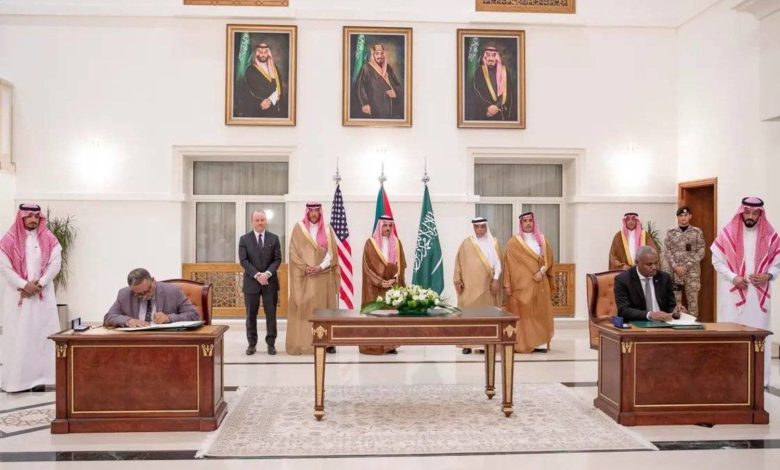Reports
After International Calls for Its Implementation: The Jeddah Agreement Between Possibility and Impossibility

Sudan Events – Agencies
The Jeddah Agreement for Sudan’s peace has returned to the spotlight, 18 months after it was signed between the Sudanese army and the Rapid Support Forces (RSF). At the time, its implementation could have prevented many violations against the Sudanese people and their property. However, the RSF, which signed the agreement, later reneged on its commitments and failed to implement any part of it.
The Quartet Meeting
Last Monday, the Quartet—comprising the United States, Saudi Arabia, Egypt, and the UAE—held a meeting in Italy on the sidelines of the G7 foreign ministers’ meeting. The Quartet issued a firm statement demanding the implementation of the Jeddah Agreement to end the war between the Sudanese army and the RSF.
Public Reactions
Sudanese reactions on social media to the Quartet’s revival of the Jeddah Agreement were mixed. Supporters argue that the army and its people have repeatedly called for implementing the agreement as the sole peaceful solution to the war. Opponents, however, view it as an obstacle to the army’s tangible military progress in various battlefields. Others expressed surprise at the renewed push for the Jeddah Agreement at a time when the army has effectively begun implementing it militarily by evicting RSF forces from civilian homes and facilities in areas like Sennar and elsewhere by force.
Water Under the Bridge
Much has happened since the agreement was signed in May 2023. One key provision—regrouping forces in agreed-upon locations and offering them options for disbandment or integration into the Sudanese army—has lost favor among broad sections of the Sudanese public, which has suffered immensely under RSF atrocities over the past 18 months.
Political analysts predict the government will face significant resistance in implementing this provision. They argue that the Sudanese people, who endured crimes such as rape, theft, and murder at the hands of RSF elements, will not accept these forces as part of their national military.
Official Position
While Sudanese officials do not consider the Jeddah Agreement obsolete, enthusiasm for it has waned. Sovereign Council Chairman and Army Commander-in-Chief General Abdel Fattah al-Burhan has conditioned ending the war on the RSF’s withdrawal from cities and civilian homes—a key clause of the Jeddah Agreement.
In his speech on Army Day, August 14, 2023, Burhan stated that Sudan’s path to peace begins with implementing the Jeddah Agreement, reached between the Sudanese army and RSF in May 2023.
However, Burhan’s more recent statements—particularly after the large-scale military operations initiated in late September—have placed little emphasis on the Jeddah Agreement. Instead, his rhetoric has focused on a single solution: the surrender of RSF elements. He reiterated this in his latest speech at the Women’s Issues Conference in eastern Sudan last Monday, declaring that “the door to repentance is open to anyone who lays down their weapons and chooses peace.”
Current Status
As of now, the Sudanese Ministry of Foreign Affairs has not responded to the Quartet’s meeting in Italy, which called for implementing the Jeddah Agreement. However, Sudan’s Permanent Representative to the United Nations, Hassan Hamid, urged the international community during an event organized by the UN High Commissioner for Human Rights last Monday to pressure the RSF to comply with the Jeddah Agreement. He specifically demanded the withdrawal of RSF forces from civilian facilities, homes, and cities immediately.
Political analysts believe the Sudanese government remains ambivalent about the Jeddah Agreement. While not rejecting it outright, its implementation would need to align with the government’s perspective. They point out that developments on the ground make the government less inclined to an agreement that could slow the army’s victories in favor of a militia that lacks unified leadership or institutional structure.
Challenges to Implementation
Analysts attribute the Sudanese government’s lukewarm stance on the Jeddah Agreement to the leadership’s conviction that it is nearly impossible to implement. The RSF now consists of fragmented, unstructured forces with foreign elements that do not even share a common language. Former RSF leader in Gezira, Abu Aqila Kekel, described the disjointed and feral nature of these forces.
Given these realities, implementing the Jeddah Agreement seems implausible, if not outright impossible, according to these analysts. They suggest the government will continue to engage the international community by nominally endorsing the agreement while recognizing that military resolution and offering individual surrenders remain the only practical solutions to eradicate this “cancer.”
The Dawn of Sudanese Liberation
Regardless of whether the Jeddah Agreement is implemented, the Sudanese army, according to its commander-in-chief, will persist in its military campaign without pause. Burhan has ruled out any political negotiations with any party. Until the dawn of the Jeddah Agreement becomes clear, the Sudanese army will continue to pave the way for the nation’s liberation through its military efforts, striving for a Sudan where its people can awaken secure and unafraid.
(Source: Sudanese Echoes)



